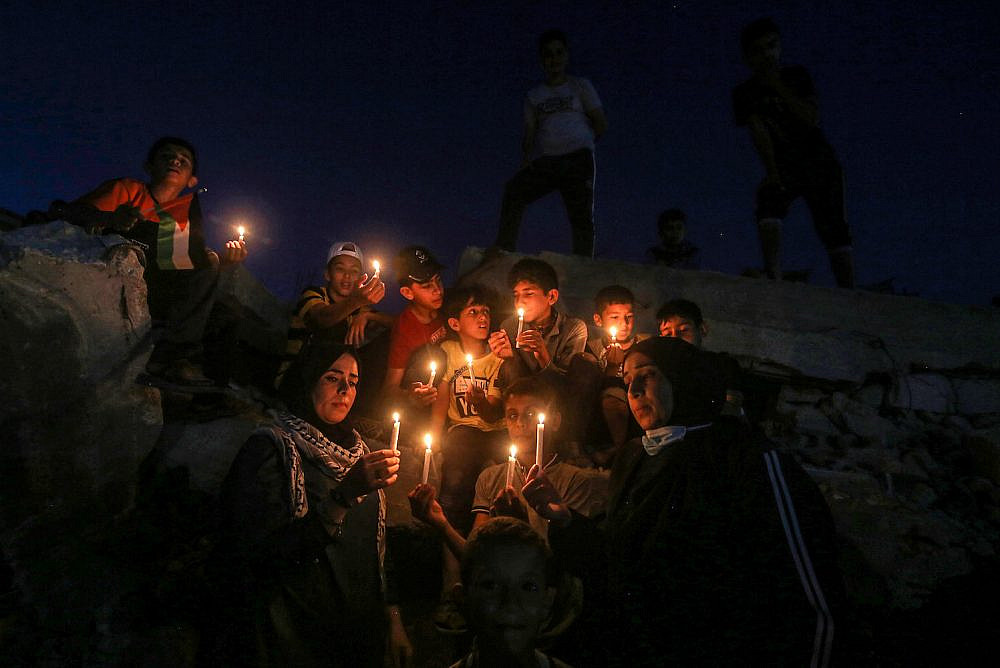We Israelis spend our entire lives seeing Palestinians only as threats
Even as our army obliterates entire families in Gaza, Israelis continue to sweep Palestinian humanity under a rug of unconvincing security justifications.
 |
I was 18 years old when I first saw the Gaza Strip. It was 2002 — the peak of the Second Intifada — and I had enlisted to the Israeli army as a scout for the Field Intelligence Corps. The area I was stationed to monitor was nicknamed the berech (Hebrew for “knee”) on the northeastern edge of the strip. I began every day by zooming in and out of a shack where a single Palestinian family was residing, looking on at people who had almost nothing. I remember them like the back of my hand: a mother, a grandfather, and a boy with bright blue eyes. Every night, they were the last thing I looked at before going to sleep.
Back then, I saw that Palestinian family as a hindrance rather than as human beings. They interfered with my job; the orchards near the fence, their meager livelihood, obstructed my field of vision. They were an obstacle to be leveled. I recall how easy and compelling it was to fall back on that military outlook, which reduces people into problems and dangers. That is how we Israelis are taught to see Gaza, its homes, its people, its children — as a constant security threat.
This is also how every Israeli action in Gaza is justified, each one pushing the line in the sand further and further away. The 2014 war, which the Israeli army codenamed “Operation Protective Edge,” involved the destruction of high-rise buildings. The latest onslaught this month, nicknamed “Operation Guardian of the Walls,” began by bombing those very same buildings. Israeli cabinet members called it “changing the equation,” and this equation is always changed in the same direction.
Operation Cast Lead — the 2008-9 Gaza war — killed 762 Palestinian civilians, of which 318 were minors. In 2014, in just a month and a half, Protective Edge killed 1,372 civilians, 528 of whom were minors, an hour’s drive away from Tel Aviv — and almost nobody seemed to care.
In the first few days of this month’s Gaza operation alone, we killed Kussai (six months old), Adam (3), Zayid (8), Hanaa (15), and Yara (10); just one of the fifteen families that we wiped off the face of the earth. The army calls this “collateral damage.” These children were buried without leaving behind so much as a ripple in Israeli society, and always for the same reason: because we see them as a threat rather than as human beings. Even a six-month-old baby.
Israeli airstrikes ultimately killed 65 Palestinian children in two weeks — kids who were born on the other side of the reality in which my own son was born. For our children to have a future free of such war, we Israelis must look at ourselves in the mirror and ask how we became a society that accepts such atrocities, resigning ourselves to “live by the sword.”
Too many times we have witnessed not just how feeble and unconvincing Israel’s security rationale is, but how it is designed to allow us to continue with our lives, even after an entire Palestinian family has been obliterated. Too many times has this justification enabled us to ignore what Israeli control looks like in Gaza, and what it means for those who live on the receiving end of our actions and whose only fault is that they exist.

As a young soldier, I watched a Palestinian family wake up every morning. I watched a boy playing, and an elderly Palestinian trying to eke out a living. At some point, it becomes impossible to shake these people from your consciousness, to sweep them under the rug of security justifications. What is happening with them today? How many of them survived the previous wars?
Along with the innumerable voices and testimonies of Palestinians in Gaza, it is also worth listening to the testimonies of the soldiers Israel sent to Gaza in 2014. The things that they describe taking part in cast a sickening shadow over the security justifications we have grown accustomed to reciting. They describe Palestinians who continued living in the populated neighborhoods we bombarded in 2014, which we had been assured were cleared of innocent people, and which we were told needed to be fired at with artillery shells.
I was born to a military family. I was brought up and educated on values of Israeli patriotism and unconditional love for Israel — for better or for worse. I was 18 when I enlisted. Eighteen years have passed since I watched the Palestinian boy in the shack over the fence. In another 18 years, my infant son is expected to take an active part in this same reality. It cannot be that the only way for him to live here is to subjugate an entire nation — innocent people — forever. I refuse to accept that this is the only option.


No comments:
Post a Comment
Note: only a member of this blog may post a comment.